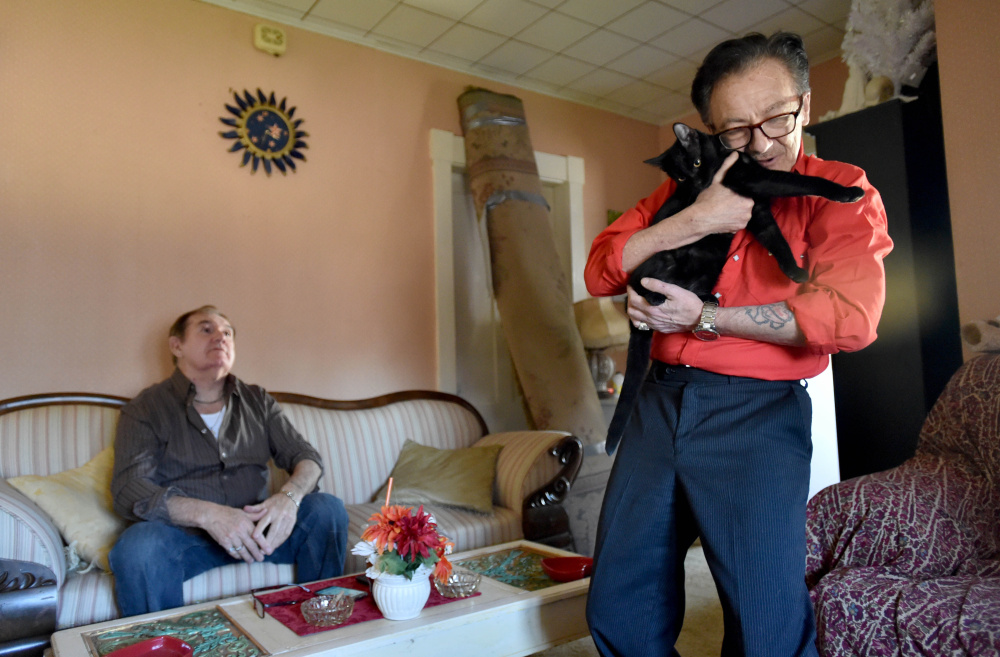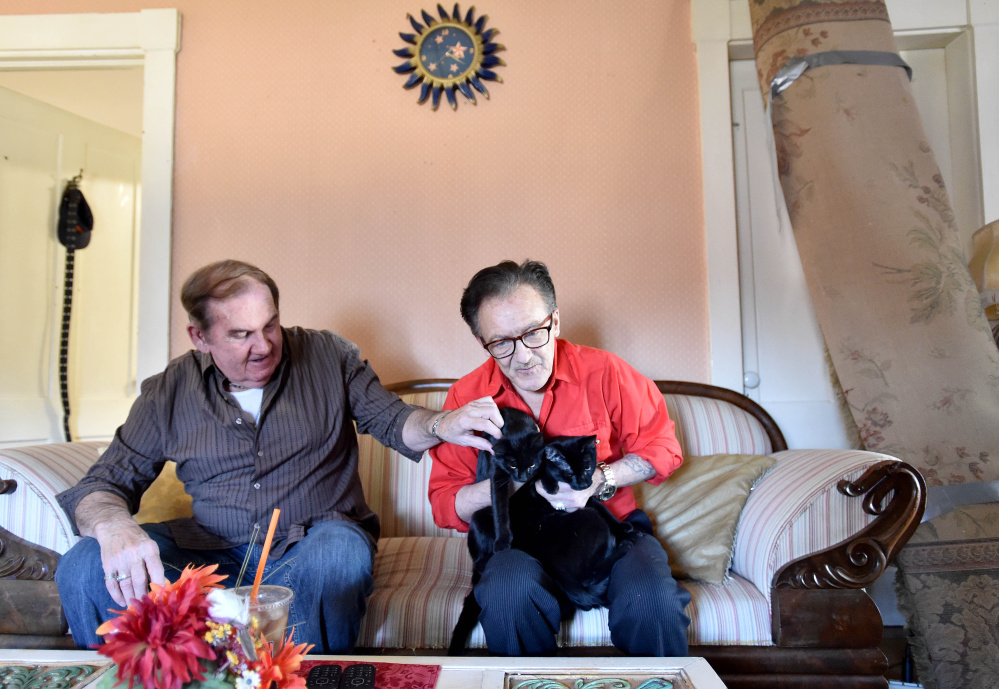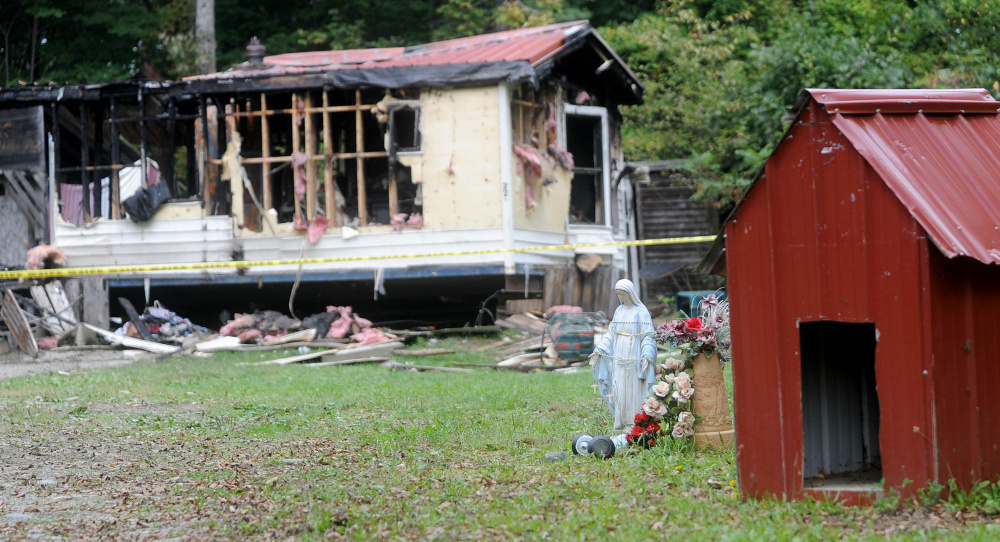Brian Aldo Baldie and Ron Pelletier lost their home and seven pets in a fire in September, leaving them scared and at a loss for an explanation.
They thought maybe there was faulty wiring in the older mobile home they shared on Browns Corner Road in Canaan, or that they had left something on the stove, but then police told them the fire was intentionally set.
“After they told me somebody did it, I thought, ‘Well, I wonder if it’s because we’re gay,'” said Pelletier, 71.
The couple, who now live in an apartment in a different central Maine community, said recently that without another reasonable explanation for the fire, they believe they were victims of a hate crime.
“Why would somebody break into somebody’s house, take a little bit of money, a little bit of jewelery and then set the house on fire with the animals in there?” said Baldie, 63. “It doesn’t make any sense. It would have to be a hate crime.”
But police say they do not consider the arson a hate crime — a crime motivated by prejudice — according to Maine Department of Public Safety spokesman Steve McCausland. He said investigators believe the motivation for the arson was an alleged dispute over missing money.
Matthew Short, of Canaan, was indicted last week on charges of arson, burglary and aggravated cruelty to animals in connection with the fire.
Short told police Baldie and Pelletier took $150 from his mobile home, also on Browns Corner Road.
Baldie and Pelletier, though, said they didn’t know Short and never took money from him. They called the allegation of stolen money “crazy.”
A police affidavit filed in court supporting Short’s arrest says that Short told an acquaintance that he “didn’t like the guys based on their sexuality.”
The statement was enough to further convince Baldie and Pelletier that their sexuality was a motivation for the fire.
McCausland acknowledged there is no evidence that the two stole from Short, “but apparently it was the motivation here,” he said. “The sexual orientation of anyone involved has not been a focus of the investigation.”
Assistant Attorney General Leanne Robbin said, in general, it can be hard to prove that just because someone has made a prejudicial statement in the past that it would be the motivation behind a crime.
While not familiar with the Canaan case, she said last week, “If there are other disputes going on between neighbors, for example, or people who have had previous relations with each other, it can be difficult to prove.”
CIVIL RIGHTS
The state’s existing criminal laws allow motives of prejudicial bias — the definition of hate crime — to be used as aggravating factors in sentencing.
The Maine Civil Rights Act also provides for a criminal charge of intentional interference with civil rights, though such a charge is rare, Robbin said. The act defines criminal conduct motivated by bias as occurring when a crime is committed against a person or property because of race, color, religion, ancestry, national origin, gender, physical or mental disability, or sexual orientation. Those factors may then be considered during criminal sentencing.
Law enforcement has the responsibility to report civil rights violations to the Office of the Maine Attorney General if officers believe a civil violation has taken place during the investigation of a crime. The attorney general’s office can also bring a civil order against the responsible party.
In June 2014, for example, the attorney general’s office issued a civil consent order against a Fort Fairfield man, Tharren MacDougal, who approached another man at Champions Fitness Club in Waterville, asked him if he was gay, and punched him in the face when he said yes. The order prohibited MacDougal from having contact with the victim and warned him not to violate the Maine Civil Rights Act again or else he would face a fine or jail time.
But there isn’t always such a clear connection between a prejudicial statement and the motivation of a crime, Robbin said.
“Sometimes when there’s a dispute, these epithets or statements come out, even though that’s not the motivation for the illegal conduct,” she said.
The FBI in a 2012 report listed 1,376 victims of hate crimes targeted because of sexual orientation nationally, which accounted for nearly 20 percent of all hate crimes reported, according to GLAAD, a nationwide gay civil rights group.
GLAAD, on a page devoted to hate crimes on its website, says it believes that local law enforcement “still places a low priority on anti-LGBT hate crimes.”
The page says that as a result, “police may not investigate the case properly or at all, may revictimize survivors, and may be unresponsive to families and/or community members seeking information.”
Jennifer Getchell, who owned the mobile home at 289 Browns Corner Road in Canaan that Baldie and Pelletier rented, said she does not think the fire was a hate crime.
“They all knew each other from prior living arrangements and didn’t get along,” Getchell said. She couldn’t say why the men didn’t get along, but “it had nothing to do with them being what they were.”
LOSS OF TRUST
The fire took place shortly after two other fires in Canaan. Baldie said he thought right away that there may have been a connection to the other fires — there wasn’t, investigators determined — and he didn’t think until later that it may have been a hate crime.
The couple moved to Maine about 15 years ago from Massachusetts to be closer to family. Pelletier’s daughter lives just a few blocks away from their new apartment.
“We never had any problems,” said Pelletier, who spends his spare time volunteering at a nearby thrift store. “We’re well-liked by everybody.”
Short told police after the fire that Baldie and Pelletier previously lived in the trailer he and his girlfriend occupied farther down Browns Corner Road, but that he didn’t know them and did not set their home on fire, according to the affidavit by Jeremy Damren, a police officer with the Office of the Maine State Fire Marshal.
On the day of the fire, Short said he got a phone call from his girlfriend, Sheena Moshier, who told him $150 was missing from their residence and that she had found a pack of cigarettes — the same type that Baldie and Pelletier smoked — in their trailer, according to the affidavit.
Short told at least two acquaintances that he beat the men up over the missing money, and one acquaintance told police that Short set the trailer on fire, the affidavit said.
Baldie and Pelletier, in an interview with police, said they were never assaulted by anyone the night of the fire and that they knew of Short but didn’t know him well.
More than seven months later, the couple has found a new apartment and adopted two new cats — Mary and Joseph — and a dog, Charlie II. Thoughts of the fire and their lost pets linger.
Pelletier said he hopes the fire can be a lesson to others.
“I want to let other people know not to be naive, because I didn’t think that stuff went on,” he said. “(The fire) kind of put me somewhere else. I don’t trust anymore. I lock my doors.
“When I hear a dog barking, I think of the dogs (that died in the fire). When I hear a fire engine, I think of that. It just puts stuff in my life that was never there before.”
Rachel Ohm — 612-2368
Twitter: @rachel_ohm
Copy the Story LinkSend questions/comments to the editors.









Success. Please wait for the page to reload. If the page does not reload within 5 seconds, please refresh the page.
Enter your email and password to access comments.
Hi, to comment on stories you must . This profile is in addition to your subscription and website login.
Already have a commenting profile? .
Invalid username/password.
Please check your email to confirm and complete your registration.
Only subscribers are eligible to post comments. Please subscribe or login first for digital access. Here’s why.
Use the form below to reset your password. When you've submitted your account email, we will send an email with a reset code.